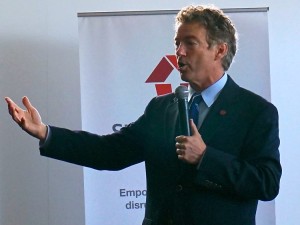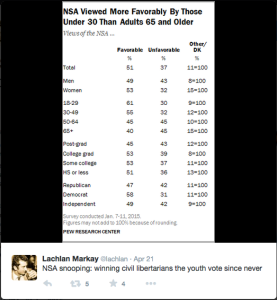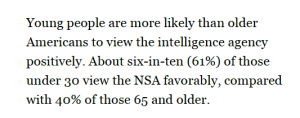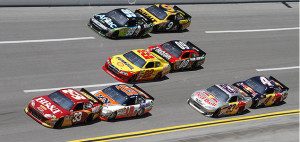Senator Rand Paul addressed a crowd of about 150 people and press at the Startup House in San Francisco, California. He was in the city to announce his procurement of ‘work space’ in the heart of the tech community and rollout additional members of his technology advisory council.
 Senator Rand Paul (R-KY) speaks at the Startup House in San Francisco, California. Photo/Reed Galen
Senator Rand Paul (R-KY) speaks at the Startup House in San Francisco, California. Photo/Reed Galen
Most Republican presidential contenders come to California for one reason: Money. Despite the Golden State’s deep blue reflection, there is still more money (even for Republicans) than anywhere else in the country.
Early on in his journey to the White House, Paul said he would spend time in the Bay Area, courting the tech community as a “different kind” of Republican. Indeed, when he spoke at UC Berkeley in the spring of 2014, he was greeted with cheers as he excoriated the NSA’s bulk data collection program.
Tough Country
But anyone under the illusion that Paul’s efforts will suddenly swing the famously liberal Silicon Valley community to the right should give up that dream. While more conservative and libertarian techies certainly exist, as of now they keep their heads down and even at that there still aren’t enough to change any electoral maps.
Despite their agreement on issues like the NSA, Paul parts with behaviorally liberal techies on social issues and net neutrality– making it difficult to gain anything other than a symbolic toehold in the cradle of technology. Indeed, he may recruit some technical talent for his presidential campaign, but not anything akin to the legion of designers and engineers who flocked to President Barack Obama’s campaigns in 2008 and 2012.
Update: I received this email from a friend of mine who happens to be a gay conservative in the technology sector: “The tech and creative communities have a lot of LGBTQ members (and allies). I think many of us will have a problem supporting/voting for someone that would 1) not hire us based on our sexuality and 2) use the sort of rhetoric he does about our lives. There is a reason he has been courting so much support in SC [South Carolina] for years…because he is a social conservative at heart.”
The Millenial Blues
Senator Paul is betting that most of his appeal to Millenial voters rests on his opposition to the NSA’s domestic spying programs. During his remarks in San Francisco, Paul noted that 70% of Millenials are opposed to the NSA’s activities. However, earlier this year, Pew Research conducted a survey showing that of all American cohorts, Millenials actually hold the most positive view of the NSA.
I mentioned this fact to a number of reporters in attendance at the event. The best rationale we could come up with is that the Millenial generation has been giving away its most personal data to Facebook, Instagram and others, as long as they’ve been tapping on smartphones. Far from being concerned about what the government knows and sees about them, they’ve voluntarily allowed the world to follow their lives; indeed they have gone out of their way to shout, “Me! Me! Me!” The “selfie” was not an invention of the Baby Boomers or even Generation X, who are technological dinosaurs comparatively.
One millennial political operative who counts herself as a libertarian expressed frustration when trying to explain to her younger sister why the NSA programs were a violation of her rights. “All she told me was that if she wasn’t doing anything wrong, she didn’t have anything to worry about.” (See, also, the Fourth Amendment to the U.S. Constitution)
If Paul’s rationale to younger voters is that he’s with them on privacy, but they don’t care, how far does that get him? Add to that, younger voters’ miserable propensity to actually show up to the polls (especially in primaries), it begs the question how much time and money the Paul campaign actually should put, or is putting, into chasing Millenials.
And if the Pew survey is to be believed, that it is actually older voters who view the NSA most negatively, is Rand Paul going after the wrong voters altogether? Of course, the Millenial play is not Paul’s only gambit. But if a 65-year Iowan doesn’t really care how “cool” you are, why spend so much time trying to make everyone believe it?
Unfortunately for Rand’s campaign, it is these same early primary voters that may agree with him on the NSA that are weary of his stance on national security. Rand Paul has become the George McGovern of the GOP field because he’s less hawkish than the rest of the field, who, despite their criticism of Jeb Bush over comments about the Iraq War, have recently been tripping over each other to pull the trigger on a Hellfire missile.
 A Predator drone launches a Hellfire missile. Courtesy Militaryaerospace.com
A Predator drone launches a Hellfire missile. Courtesy Militaryaerospace.com
So to recap: Millenials MAY like Rand Paul, but his rationale to them may be dubious and there aren’t enough of them in early primary states to catapult him to victory. Older voters who share his views on the NSA may not vote for him because of his previous stances on Israel, the Middle East or any number of foreign policy issues.
Indeed, this may be a problem writ large for Paul’s electoral strategy. Much like a NASCAR driver caught between the high line and the low line, if Paul can’t find his way into the pack, other campaigns may draft together and leave him behind. Staking out new ground in politics always comes with risks – and one has to have a base from which to work. A question worth asking: Why risk alienating the anti-intervention libertarian core of support to whom he has unique appeal in order to try and win over a group that will never pick him in the primaries?
*Author’s Note: I was an organizer of the Saturday event.




